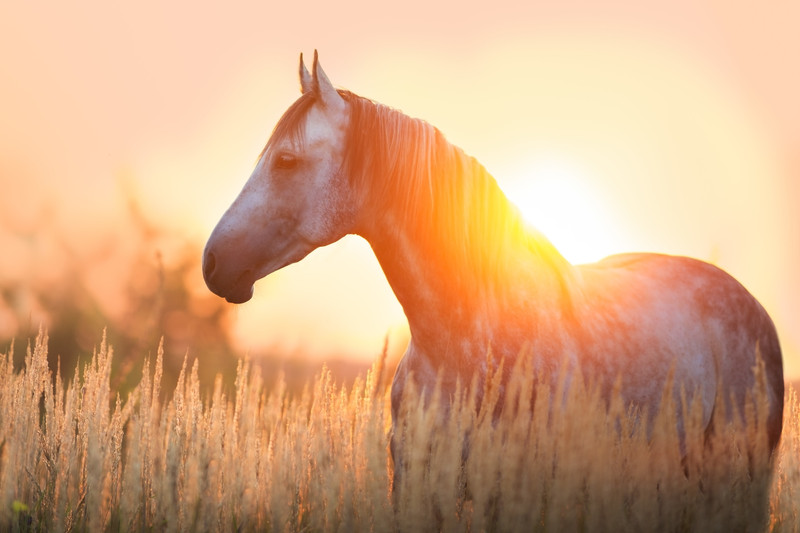Vitamin E is considered the most important antioxidant and works closely with selenium to protect the body from the oxidative stress of exercise, illness and certain medical conditions. Learn more about this important vitamin and what it does for your horse’s health.
Vitamin E is a fat-soluble nutrient that is essential to all horses. It is a powerful antioxidant that helps horses recover from stress that is put on cells within the body (oxidative stress). Antioxidants work to stabilize a cell that has been damaged, known as a free radical. Traveling, performance, heavy work-loads, illness, etc. will cause damage to a horse’s body that starts on the inside and slowly becomes visible on the outside. Vitamin E also plays a very important role in neuromuscular, cardiovascular, reproduction and immune function. Horses with a vitamin E deficiency can be at risk for several conditions as well as general muscle soreness and poor performance. Development of these conditions can be contingent on multiple factors such as the extent of Vitamin E deficiency, genetic predisposition, and at what point in the horse’s life the deficiency occurs.
Vitamin E is considered an essential nutrient, meaning horses cannot make it themselves and it must be obtained through the diet. Vitamin E is found in high amounts in fresh pasture. However, Vitamin E levels drastically drop once forage is cut for hay. Access to lush green pasture round the clock is not always a realistic option for horse owners. As a result, horses without access to fresh high-quality pasture are at risk for deficiency which can result in developing some neuromuscular concerns. It is quite common horses need Vitamin E supplemented into their diet, regardless of their age or workload.
Supplementation of Vitamin E
Current National Research Council (NRC) daily recommendations for vitamin E in horses are 1 -2 IU of Vitamin E per kilogram of body weight per day which equals 1,000-2,000 IUs for a 500 kilogram (1,100 pound) horse. However, these NRC recommendations do not discriminate between natural or synthetic sources. The NRC has set the upper safe diet concentration at 20 IU/kg body weight based on biopotency of synthetic vitamin E (10,000 IU/500 kg horse).*
Higher levels of Vitamin E is often directed by a veterinarian in the management of certain medical conditions of the muscle and/or nervous systems. Horses challenged with specific conditions may benefit from higher levels of Vitamin E, 8,000 IU’s -10,000 IU’s (or approx. 3,000-5,000 IU of Natural Vitamin E). These amounts should be administered for specific time periods as directed by a veterinarian. Routine blood work can help determine and check vitamin E levels in your horse’s system to help determine if deficiency is present and calculate an adequate amount of supplementation required.
Forms of Vitamin E
Vitamin E can be provided to horses in both natural and synthetic forms. Oftentimes, the synthetic form is found in many horse feeds and supplements because it is less costly. However, it is important to note the synthetic form is less bioavailable, meaning horses have a harder time absorbing and storing it. Natural Vitamin E has been researched to be up to 2.5 times more bioavailable than the synthetic form of Vitamin E, plus the horse is able to store Natural Vitamin E more efficiently. In other words, a horse has to consume a higher level of the synthetic form to achieve the same levels in the bloodstream as the Natural Vitamin E.
On a supplement label, natural vitamin E is listed as d-alpha tocopherol. In contrast, synthetic forms of vitamin E are labeled with a dl- prefix. Some studies show liquid form of Vitamin E may contribute to a more rapid absorption rate. However, power and pelleted forms can also be absorbed effectively over time. If a horse does not take liquid well, many horse owners find the convenience of pellet as the best option to reduce waste and ensure they are consuming the full dose.
Vitamin E is a nutrient that plays an important role in your horse’s health and well-being. If you believe your horse may be showing signs of deficiency, discuss with your veterinarian about testing your horse’s Vitamin E levels.
*UC Davis Veterinary Medicine: https://www.vetmed.ucdavis.edu/labs/finno-laboratory/vitamin-e-horses

